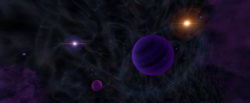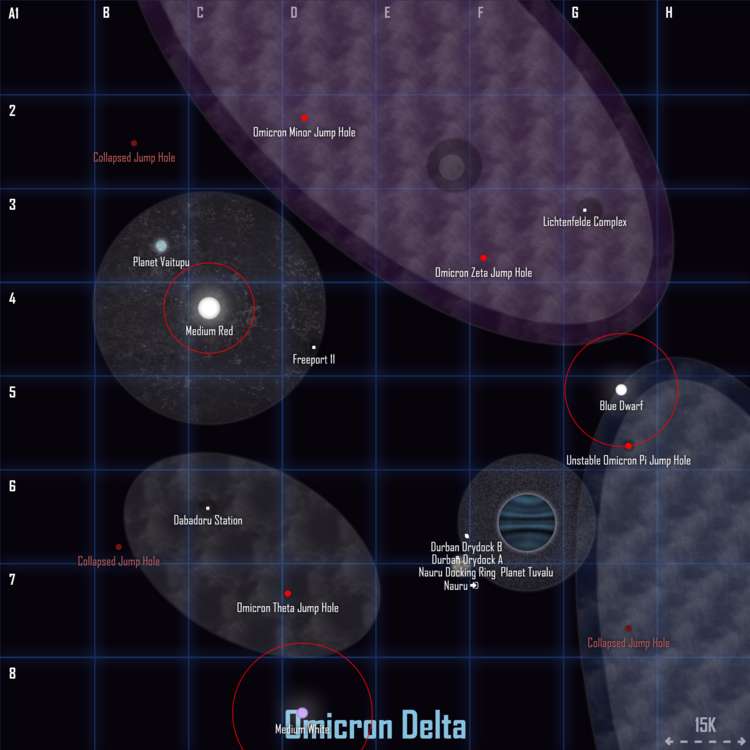| Omicron Delta | |
| System | |
| Governing House | Independent |
| Region | Nomad Worlds |
| Connected Systems | Omicron Theta Omicron Pi Omicron Minor Omicron Zeta |
No description available.
System Overview
|
Astronomical Bodies
Stellar Objects
Medium Red
Planetary Objects
Nebulae & Asteroids
|
Industrial Development
Space Stations
Commodity Mining
|
Faction Presence
Lawful Factions
Corporations & Guilds
Unlawful Factions
|
System Map
Areas of Interest
Nebulae
Tokelau Ice Cloud
A strange looking ice field composed mostly of peculiar spindle-shaped crystals having the same chemical composition as very similar fields in Omicron Kappa or Alaska, The Tokelau Ice Cloud is a beautiful cloud on the outskirts of the Omicron Delta system. Numerous independent scientists have unsuccessfully tried to explain the nature of these strange ice formations and their true origins.
While the ice remains nothing but a scientific curiosity, there are large and rocky formations hidden deep within the Tokelau Ice Cloud. As any other native planetary in Omicron Delta, they are rich for easily accessible Iridium deposits and became the most important source of Iridium for humanity, seconded only by Nauru's own Iridium deposits.
Exploitations of Tokelau's mineral riches are not without their risks however, as these metal-rich planetary fragments are the main source of various electromagnetic interferences within the cloud, which consistently get worse as ships venture deeper into the cloud. These interferences have been reported to disrupt and cause malfunctions with ship propulsion, communication and sensor systems.
As a result, any mining operations within the Tokelau cloud remain extremely dangerous thanks to these interferences and local factions are not making it any easier with their conflicts over the control of these Iridium deposits. Many mining, escort and combat ships have been lost within the cloud, never returning to their bases.
Palau Ice Cloud
The Palau Ice Cloud is a beautiful cloud on the outskirts of Omicron Delta system, possibly a former part of the Tokelau Ice Cloud that drifted away. Rumours have run rife in Omicron Delta of a mysterious, rare and active alien ruin located within the cloud. However, constant fighting between The Core and the Corsairs within the Palau Ice Cloud have deterred Xenoarchaeologists from getting a closer look.
Asteroid Fields
Oreor Fragments
A large rocky field orbiting Omicron Delta's primary star, which was created by the disintegration of a larger planetary body while it was orbiting its star in close proximity.
A large number of independent prospectors ventured into the field in hopes of finding yet another rich Iridium deposit as all Omicron Delta bodies are rich on Iridium, but such deposits were never found. Only the more recent astro geological studies suggest that the original planetary body was a rogue planet named Oreor, which entered the Omicron Delta system millions of years ago and eventually spiralled too close to the system's main star.
While the Oreor Fragments are known for various subpar mineral deposits and riches, it remains economically insignificant in comparison to the Tokelau Ice Cloud and serves mostly as a hiding spot for whoever needs to hide from others as the local factions are still locked in their fight for dominance over the system.
Kiribati Asteroid Field
An asteroid field comprised mostly of the porous rocks made largely out of the organic compounds like other similar looking fields located in Omicrons. Many prospectors and scientists have tried to find anything of value in the field, but they have not been successful. As a result of this, the Kiribati Asteroid Field remains economically insignificant for human needs in Omicron Delta for the foreseeable future.
The Kiribati Asteroid Field is currently an important and convenient hiding spot for the Order forces spying on any Core ships leaving or entering the Omicron Rho anomaly located in the field.
Mineable Zone
IRIDIUM ORE
Iridium is a dense, very hard, brittle, silvery-white transition metal of the platinum family, and is the most corrosion-resistant element known to exist. It is used in multiple commercial applications, from increasing the efficiency of polymers, creating high-temperature alloys for use in fusion reactors and other high-temperature environments, to the production of antimatter and antimatter based weapons. It is a very rare material and its only known abundant source is in the Omicron Delta system.
Wrecks
Jump Gates/Holes
| Target System | Type | Location |
|---|---|---|
| Omicron Theta | Jump Hole | D/C-7 |
| Omicron Pi | Jump Hole | G-5 |
| Omicron Minor | Jump Hole | D/C-2 |
| Omicron Zeta | Jump Hole | E/D-3/4 |
| Omicron Delta | Jump Hole | B-3 |
NOTE: Page generated on the 07/06/2024 at 15:55:46 UTC

